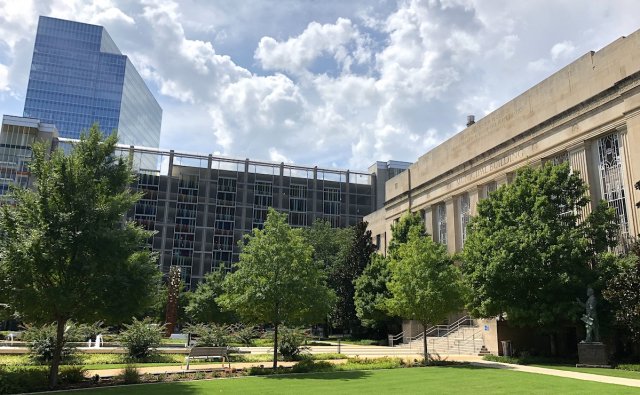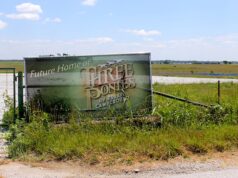

(Update: On Tuesday, Aug. 27, the OKC City Council unanimously approved to set the following MAPS 4 package for a public vote on Dec. 10.)
A resolution for Tuesday’s OKC City Council meeting proposes that members set a Dec. 10 election for MAPS 4 that features all 16 projects presented for consideration this summer.
In total, the MAPS 4 package would spend about $978 million through the extension of $0.01 sales tax first enacted in 1993.
City officials and others presented ideas for MAPS 4 projects at a series of public meetings throughout July and August. Those meetings highlighted the aim of each potential project as well as the projected costs.
“We have the resources to do all the things that were formally presented this summer, and that’s a great thing because those projects really cover a broad spectrum of needs in our city,” Mayor David Holt said Friday afternoon. “I would characterize those as falling into four buckets: neighborhood needs, human needs, quality of life and jobs.”
Holt said the human and neighborhood needs make up more than 70 percent of the MAPS 4 package.
“So yes, we want to pursue a stadium because we’re the only top-50 city that doesn’t have a multi-purpose stadium,” Holt said. “But if you don’t like it, it is literally less than 4 percent of MAPS 4.”
Holt said MAPS has always been a compromise and an attempt to meet a lot of different priorities in the city.
“Everything on that list is greatly desired by a lot of different people,” Holt said. “I hear the exact same thing from a lot of different sides. I hear, ‘Nobody wants social services,’ and I hear, ‘Nobody wants sports stadiums.’ And they’re both wrong.”
Aug. 27 OKC City Council resolution
https://nondoc.com/wp-content/uploads/2019/08/M4resolution.pdf” height=”450px” download=”all”]MAPS 4 project overviews
The following projects were presented to the public during the July and August meetings, and each has been paired with a proposed allocation listed in the resolution embedded above.
Palomar Family Justice Center: The city’s family justice center has outgrown its current facility and needs a new one, executive director Kim Garrett said in her July presentation. The resolution would allocate $38 million for new construction.
Parks: Replacement of benches, new playground equipment, splash pads and installation of bathrooms would be among the items included in the project. The resolution released Friday would specify $63 million for improving every existing OKC park.
Additionally, $60.5 million would be allocated in the following manner:
- $29 million for construction of soccer complexes aimed at attracting regional and national youth tournaments;
- $11.5 million enhancements to the Oklahoma River;
- $5 million for renovation of Booker T. Washington Park in northeast OKC;
- $2.5 million for “placemaking” at Lake Stanley Draper in southeast OKC;
- $2.25 million for a new park in Canadian County;
- $2.25 million for a new park in Cleveland County;
- $2.25 million for a new park in southeast OKC;
- $2.25 million for a new park in northeast OKC;
- $500,000 for community gardens;
- $500,000 for basketball and pickleball courts;
- $500,000 for improvements to Minnis Lakeview Park.
Sidewalks, bike lanes, trails and streetlights: This plan would include improvements to street lights, construction of bicycle trail and additional sidewalks throughout the city. The resolution would allocate $55 million for those items.
Freedom Center: Long an epicenter of civil rights in Oklahoma the Freedom Center is due for a makeover. This plan would provide for preservation of the existing structure, and for the creation development of a civil rights museum. The resolution would allocate $16 million.
Youth centers: This project would provide funding for the construction of at least four youth centers in Oklahoma City to replace outdated buildings currently in use. The resolution would allocate $70 million for the youth centers.
Beautification: The proposal calls for improving the city’s aesthetics, including public art, streetscaping, planting of trees and several pedestrian bridges. The resolution would allocate $25 million for beautification projects.
Oklahoma State Fair Coliseum: This project would fund construction of a new arena at State Fair Park to replace the existing structure now more than 50 years old. The resolution would allocate $63 million for the new coliseum with the expectation that it be “supplemented by at least $25 million of hotel tax revenues earmarked by law to improvements at the OKC Fairgrounds, as well as funding from MAPS 3 excess funds, naming rights and other sources.”
Animal shelter: Expanded kennel and examination space and a host of other amenities with the construction of a new animal welfare center in southeast Oklahoma City. The resolution would allocate $38 million for a new animal shelter.
Senior wellness centers: This project would provide funding for the construction of a fifth new senior wellness center to accompany four more that are complete or in construction. The resolution would allocate $15 million for that new construction and $15 million more for operations of the city’s senior centers.
Transit: Improving Oklahoma City’s transit system would be the aim of a plan that would include park and ride centers, new buses, enhanced bus service, streetlight technology enhancements and improvements to existing bus stops and long-term planning studies. The resolution would allocate $87 million for transit projects.
Homelessness: The proposal calls for improving the city’s current public housing options, adding new ones and developing 500 low-cost single family housing units. The resolution would allocate $50 million with hope that such funding “will potentially leverage over $400 million in housing funding available from various sources.”
Chesapeake Energy Arena: One of the most expensive proposal of all the MAPS 4 ideas, the Chesapeake Energy Arena would receive upgrades as well. The resolution specifies $115 million to provide fan and cosmetic enhancements to the home of the Thunder and other improvements to the team’s practice facility.
Diversion hub: This project would provide for the construction of a facility to assist those currently in the criminal justice system with work and life skills, among other programs. The resolution would allocate $17 million to construct the diversion hub, and it references “an offer of a $20 million philanthropic donation to provide operational funding.”
Mental health: Construction of two crisis centers, a restoration center and housing for the mentally were included in the proposed project. The resolution would allocate a total of $40 million for those projects.
Multipurpose stadium: This project would provide funding for construction of a new multipurpose stadium that could house high school sporting events, the Energy FC soccer team and other potential teams. The resolution would allocate $37 million for the stadium.
Innovation district: The proposal would link Booker T. Washington Park to the Oklahoma State Capitol. It would also feature the construction of an innovation hall, and development of a center to promote the creation of minority owned businesses. The resolution would allocate a total of $71 million for various components of the innovation district.
Holt: MAPS 4 ‘evolved’ into ‘MAPS for Neighborhoods’
Holt said the City Council is expected to vote on the resolution Tuesday. It only needs a simple majority of council members to be approved, the same sort of majority it would need from voters on Dec. 10.
“This is the ‘MAPS for Neighborhoods’ that people have been calling for for the better part of a decade,” Holt said. “We’re not calling it that, but I think that’s certainly what it has evolved into.”
(Correction: This story was updated at 5:10 p.m. Friday, Aug. 23, to correct reference to the Chesapeake Energy Arena’s improvement costs.)




















